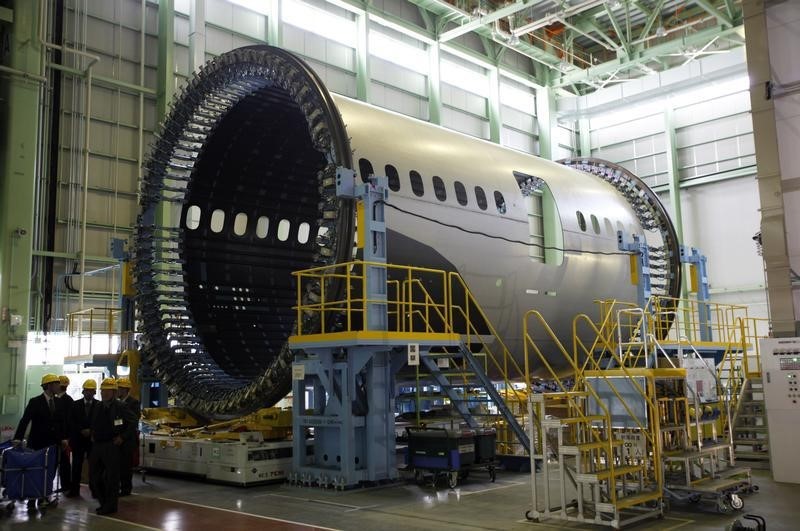(Bloomberg) -- Battling to win customers on the prized trans-Pacific route to New York, Qantas Airways Ltd. and Air New Zealand Ltd. plan new features to make air travel more comfortable, including full-sized bunk beds and dedicated stretching zones.
The two airlines, longtime competitors on three-hour hops between Australia and New Zealand, are going head-to-head on 16-hour direct flights from Auckland to New York as more efficient planes make such routes viable. The reward is a lucrative corner of a global travel market, where airfares and profits are soaring after pandemic restrictions came to an end.
Air New Zealand will next year add so-called Skynest bunks in economy class, allowing passengers to book four-hour blocks of sleep in special pods. Prices haven’t yet been announced. Customers on the carrier’s direct New York flights — launched in September — can already opt for a Skycouch, which transforms a row of three economy seats into an improvised bed.
Air New Zealand Is Launching Lie-Flat Economy Seats in Two Years
Qantas wants to muscle in on its rival’s patch by introducing non-stop Auckland-New York flights in June. The company is pouring millions of dollars into a new airport lounge in Auckland and three more across Australia to funnel customers onto the route. Both airlines are using Boeing (NYSE:BA) Co. 787 Dreamliners.
Then in late 2025, Qantas will start the world’s first direct flights connecting Sydney with New York and London. The carrier has ordered 12 customized Airbus SE (OTC:EADSY) A350-1000 planes to fly the routes. They’ll have extra legroom in economy and a “Wellbeing Zone” for passengers to stretch or grab a water.
If successful, Air New Zealand’s services to New York from Auckland and the Qantas marathons from Sydney could establish a blueprint for adding extra comforts on other super-long flights criss-crossing the globe. Singapore Airlines (OTC:SINGY) Ltd.’s 18-hour service to New York is currently the longest direct commercial flight.
The flights to New York could also spur fresh demand for onward connections to Europe across the Atlantic.
“It’s a big draw card with hundreds of European destinations, including London and Paris, just a short flight onwards from NYC through our partner airlines,” Air New Zealand Chief Customer and Sales Officer Leanne Geraghty said.
Geraghty said bookings have been “very strong” on the Auckland-New York route since the September launch. Outbound demand from the US picked up after the start of the Southern Hemisphere summer, she said.
The strategic importance of the direct route is partly why Qantas and Air New Zealand are willing to remove profitable seat space in their cabins in order to give passengers more legroom or somewhere to stretch and sleep.
“A lot of people who are traveling those kind of distances are looking for that little bit of extra comfort,” said Christchurch-based Brent Thomas, chief operating officer of travel agency House of Travel. “The pricing right now reflects how much demand there is.”
Return Auckland-New York direct flights in economy in August with the airlines cost between NZ$2,300 ($1,480) and NZ$3,200, according to kayak.com. By comparison, Air New Zealand flights that stop en route at Houston or Los Angeles are going for under NZ$2,000.
Airfares everywhere are rising almost unchecked as travel demand outstrips seat availability in the wake of the pandemic. The keen appetite to fly is also allowing airlines to pass on elevated fuel costs to passengers.
United Airlines Holdings (NASDAQ:UAL) Inc., for example, this week said first-quarter profit will be more than double analyst estimates. Qantas, which was 11 weeks from collapse at the worst of the pandemic, will generate record profits this financial year and next, according to analyst forecasts.
The Americas and Europe have for years been Air New Zealand’s biggest long-haul market, above traditional Asian holiday destinations, according to airline data. The New York route is a key part of the company’s efforts to optimize its international network, Geraghty said.
Given the challenges of flying such a long distance, Air New Zealand has reduced passenger loads on its Boeing 787s to make sure they get to Auckland from New York in one hop against the wind. The airline had to offload the bags of as many as 65 passengers at John F. Kennedy Airport before the inaugural flight in September. Another almost had to stop for fuel in Fiji on its way south.
High Winds Cause Payload Issue For World’s Fourth-Longest Flight
Qantas declined to comment on the new Auckland-New York service, but Chief Executive Officer Alan Joyce said last year that flying to New Zealand first would allow more regional Australians to connect to the US.
“There’s a whole lot of reasons why this will be successful,” said Thomas at House of Travel in New Zealand.
©2023 Bloomberg L.P.
